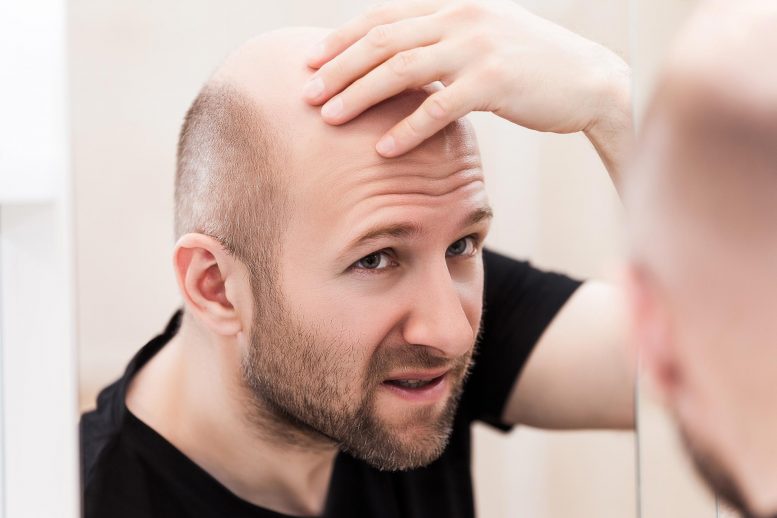BREAKING! Androgens: Study Shows Bald Men Mostly Likely To Suffer Severe COVID-19 Conditions Due To High Levels Of Androgens
Source: Androgens And COVID-19 Jun 23, 2020 5 years, 7 months, 3 weeks, 2 days, 2 hours, 5 minutes ago
Androgens: Studies have now emerged that bald men have a higher chance of ending up with severe conditions of COVID-19 when they contract the SARS-CoV-2 coronavirus.
https://onlinelibrary.wiley.com/doi/full/10.1111/jocd.13443 and
https://www.jaad.org/article/S0190-9622(20)30948-8/fulltext

Typically male pattern baldness is associated with high levels of male sex hormones called androgens. And androgens seem to play an important role in the entry of SARS-CoV-2, the coronavirus that causes COVID-19, into cells.
Hence it is possible high levels of androgens might increase the risk of severe infection and death from COVID-19.
https://www.jaad.org/article/S0190-9622(20)30608-3/pdf
This new hypothesis is important to identify individuals at risk and raises the possibility of new treatment strategies for COVID-19.
Already it has been obvious from early in the pandemic that men are at greater risk of severe infection and death from COVID-19 than women.
Numerous possible factors are at play here. For one, men are more likely to suffer from chronic conditions known to pose a higher risk of serious illness from COVID-19. These include heart disease and diabetes. Also men's immune systems are not as good as women's at warding off the severe effects of viral infections. All these factors are indirectly influenced by sex hormones. Now it seems sex hormones might also have a direct effect on SARS-CoV-2's ability to enter our cells and establish infection.
In a Spanish study of 122 male COVID-19 patients admitted to hospitals, 79% were bald ie about double the population frequency.
https://www.jaad.org/article/S0190-9622(20)30948-8/fulltext
A smaller study also in Spain observed a similar overrepresentation of baldness among men hospitalized with COVID-19.
https://onlinelibrary.wiley.com/doi/full/10.1111/jocd.13443
It is known that male pattern baldness is strongly associated with a higher level of dihydrotestosterone (DHT), a more active derivative of testosterone, and one of the androgen family of male sex hormones.
Hence it can be suggested that a higher DHT level could be a risk factor for severe COVID-19.
The SARS-CoV-2 coronavirus enters human lung cells when a protein on the virus' surface (the spike protein) latches onto protein receptors (ACE2 receptors) embedded in the cells' surfaces. Researchers have discovered that an enzyme called TMPRSS2 cleaves the SARS-CoV-2's spike protein, enabling it to bind to the ACE2 receptor. This allows the coronavirus to enter the cell.
https://www.sciencedi
rect.com/science/article/pii/S0092867420302294
Significantly, the gene that encodes TMPRSS2 is activated when male hormones, particularly DHT, bind to the androgen receptor (a protein on the surface of cells, including hair cells and lung cells).
Hence the more male hormone, the more androgen receptor binding, the more TMPRSS2 is present, and the easier it is for virus to get in.
A recent preliminary, non-peer-reviewed study which correlated the androgen levels of hundreds of people in the UK with COVID-19 severity supports this theory. Higher androgen level was associated with susceptibility to and severity of COVID-19 in men (but not women, who have much lower androgen levels in their blood).
https://www.biorxiv.org/content/10.1101/2020.05.12.091082v2
The study team also showed that inhibiting androgen receptors reduced the ability of SARS-CoV-2's spike protein to bind to ACE2 receptors on stem cells in culture.
It has been known that over- or underproduction of androgens in the body causes a variety of conditions in both men and women.
For example, men with benign prostate enlargement overproduce androgen.
https://www.ncbi.nlm.nih.gov/pmc/articles/PMC3179830/
Women with overproduction of androgens can also develop polycystic ovary syndrome.
https://www.ncbi.nlm.nih.gov/pmc/articles/PMC6780983/ and
https://pubmed.ncbi.nlm.nih.gov/19390322/
Most of the time such conditions are treated with androgen deprivation therapy (ADT), which inhibits the production or effect of androgens. For instance, prostate cancer, in which cancer cell growth is fuelled by androgens, is routinely treated with ADT.
It should be interesting to find out whether, as the androgen hypothesis predicts, patients with over- or under-production of male hormones are at greater or lesser risk of COVID-19.
Should the androgen link hold up, this would encourage exploration of anti-androgens as a way to prevent and treat COVID-19.
Already numerous anti-androgens are already approved for the treatment of other conditions. Some, like baldness treatments, have been used safely for years or decades. Some, like cancer treatments, can be tolerated for months.
https://www.ncbi.nlm.nih.gov/pmc/articles/PMC6723105/
Significantly, a study which looked at men hospitalized with COVID-19 in Italy showed the rate of infection was four times lower in prostate cancer patients on ADT than in untreated cancer patients.
https://www.ncbi.nlm.nih.gov/pmc/articles/PMC7202813/
Maybe even a single dose given to someone who tests positive to SARS-CoV-2, or has just been exposed, would suffice to lower the chance of the virus taking hold.
However detailed research is needed to confirm this. Several androgen-suppressing drugs are now undergoing clinical trials to determine whether they reduce complications among adult males with COVID-19.
https://clinicaltrials.gov/ct2/show/NCT04397718
However it should be noted that anti-androgen treatments have several side effects in men, including breast enlargement and sexual dysfunction, so medical oversight is a must.
The correlation between androgen and COVID19 severity could go a long way to explaining why men are more susceptible to COVID-19 than women. It also may explain why children younger than ten seem very resistant to COVID-19 because, until puberty, boys as well as girls make little androgen.
For more about
androgens and COVID-19, keep on logging to Thailand Medical News.
HELP! Please help support this website by kindly making a donation to sustain this website and also all in all our initiatives to propel further research: https://www.thailandmedical.news/p/sponsorship
